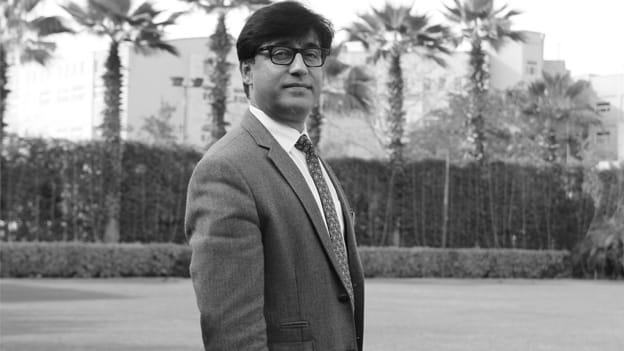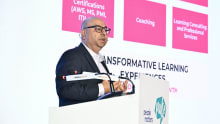Raj Nehru on Bridging the Industry-Academia gap

To bridge the gap between industry and the academia, Raj Nehru – the Vice-Chancellor at India’s first skill University, is a man with a mission. Nehru has been bestowed with an enormous responsibility by the Government. And that is to develop qualified youths with skill proficiencies, provide flexible learning opportunities to the youth along with imbibing them with a spirit of entrepreneurship.
In this pursuit, Nehru has been successful in paving the first path. In April 2017, the Haryana Vishwakarma Skill University signed a MoU with Hartron Electronics Industries Association (HEIA) in Gurgaon for opening a centre for training and making youth worthy of employment under the Saksham Yuva Scheme of the state government.
This MoU will help 10,000 students to be entrepreneurs either by becoming empanelled resources or trainers for various public and private entities in different sectors such as education, public service among others. This is in line with the University’s aim to build credit framework for competency based skills, establish knowledge partnerships and to undertake collaborative research with any organization.
Nehru said, “Our intention is to become a centre of excellence and produce job-ready resources, rather create earnable resources. To help candidates become future-ready for jobs, an on-the-job training component from public and private sector companies has been integrated into the programs.”
And this is the first of the many things that Nehru has undertaken to develop India’s first skill University. His work towards creating this University has no precedence. He says, “You know, it’s very much like a start-up because everything has to be created from the scratch.” And given his vast repertoire of work, he has taken this plunged. Armed with about 20 years of corporate experience, he was itching to do something different. And this was when this offer came to him. “There is a vital need to revive this great legacy of ours, as India leaps into the cusp of its growth with more than 54% of its total population below 25 years of age. Thus, making us one of the youngest nations of the world. Also, the next 20 years will see India’s labour force increase by 32% while rest of the world sees a decline by 4%,” he says.
The University, he says will be developed in Palwal district in Haryana. However, a temporary office has been provided in Gurgaon. Nehru’s corporate relationships have helped him to get volunteers from the industry who are spending time with him to formulate a plan for hiring resources, meeting technocrats, meetings with institutions from outside India, and planning for short-term courses to be rolled out.
Nehru has set a target – in 2017 he expects that about 1000 students graduate from this University. And the first step is the HEIA MoU. It will provide three-month job training to trainees who will be undergoing various skill development programs offered by the University.
One of the most important aspects that the University has to keep in mind is that in the 5-10 years, which sectors will have an impact on the GDP – that’s why the focus as Nehru says is to identify the sectors and build skill intervention programs for such sectors. “While we are focussed on skills of today, we must ensure that skills of tomorrow – AI, Robotics, Machine-learning get due diligence as they will help the state to generate employment in future.” The University has plans to enter into MoUs with different countries, to try to understand the good skill models as examples of Best Practices like that of Singapore, but adapt those models depending on the geographical requirements of India. “It just not lifts and shift,” Nehru says. Focus on Entrepreneurship and Skills of Tomorrow will also form an important prerogative of the University. These will be complimented with Re-skilling, Up-skilling and Research & development programs to facilitate continuous learning for horizontal and vertical growth of the aspirants and the organizations.
Thus, University aims to address the complete value chain of skill education with the multipronged approach of:
- Feeder Schools at Secondary Education level
- Finishing Schools for Graduating and Post Graduating students
- Industry-aligned work study program promoting earn-while-learn model
- Incubation Centres for Entrepreneurship and Skills of Tomorrow; and
- Continuous Learning Programmes
Technology has already widened its reach in redefining the way learning is imparted. “For example, MOOCs and Coursera are now helping people connect from anywhere. So leveraging the digital media with gamification, simulative practices which help in developing the skilling are most important. The University wants to inculcate the inclusive learning, virtual learning, embedded learning, and methods can be through classroom, on-the-job, mobile learning or even apprenticeship,” the VC says.
But challenges are galore. One of the major challenges that Nehru can foresee is the mindset of the people in attending a digital classroom. And it’s not only at the ground level, but also educated people who refuse to see or give credit to education which has been obtained digitally. “While the negative mindset can be changed over the years and with positive outcomes, but how do you deal with the current bandwidth or network problem? A good infrastructure has to be in place – youth need to have access to laptops, smart devices to be able to connect digitally and learn,” says Nehru.
Connecting the speed into action, the University has already seen a registration of 12,000 PG students on its portal, and 6,000 PG students have been approved for skilling programmers. Communications and Sales skills remain the most in-demand from them apart from BFSI, agricultural skills and IT. The University has already devised short-term modules in Communications and Sales.
While the industry response has been impressive, the University wants more collaborations. “I invite Industry, Institutions of Excellence and Subject Matter Experts to collaborate with the university in bringing vocational and skill education to mainstream and Indian skilled workforce at the forefront of the world skill stage. I also welcome Angel Investors, Venture Capitalists, and Entrepreneurship Enthusiasts to work together with the University in giving wings to budding entrepreneurs and their innovative ideas. I also urge industry professionals to come and volunteer by teaching, training and gifting the empowering skills to the aspiring youth,” Nehru signed off.











